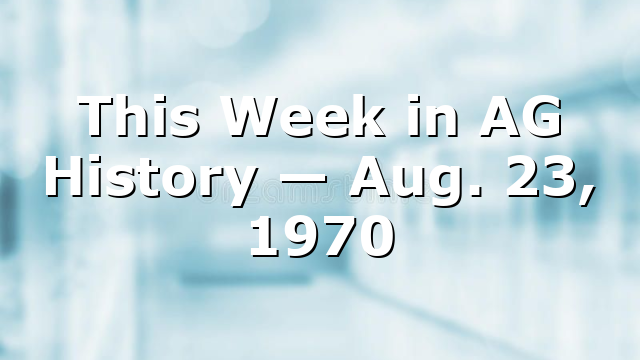
This Week in AG History — Aug. 23, 1970
Thurman L. Faison (1938- ) was one of the early leaders of the National Black Fellowship of the Assemblies of God and served on various committees with the AG. In 1970, Faison shared his thoughts on how best to serve God in a climate of social unrest.
Faison was born in Texarkana, Arkansas. After serving in the US Air Force, he began preparation for the ministry by studying at Eastern Pentecostal Bible College (Peterborough, Ontario, Canada), from which he graduated in 1963. He returned to the United States and served many years as an AG pastor and evangelist and also ministered on WCFC-TV 38, a Christian television station in Chicago started by AG minister Owen Carr. He received a BA from North Central Bible College in 1972. He also earned a master’s degree from National Louis University (Evanston, Illinois) in 1981.
Faison addressed the 1965 General Council, and he has been a guest speaker at various Assemblies of God colleges. In recent years, he has written a number of books, including: To the Spiritually Inclined, Be Spiritually Bold, The Spirit of Man, and As Far as the East Is From the West.
In 1970, Faison (then pastor of Southside Tabernacle AG in Chicago) addressed the annual convention of the Evangelical Home Missions Association (EHMA) on the subject, “How to Reach the Inner City.” That meeting was held in Kansas City in conjunction with the National Association of Evangelicals (NAE) convention.
“Climate of Change” was the title of Faison’s message. He did not deal with any specific methods for reaching the inner city. He said, “There are no sure-fire methods of reaching any community.” According to Faison, methods change with the environment. Some things work in Harlem that may not work in Chicago or some other large city.
Faison recognized a changing scene in the Black community, as well as in the rest of the world, with shifting of priorities and the emergence of new concepts. He felt like society was in the midst of “a social renaissance.” People were concerned that they were victims of cultural patterns and preconditioned concepts, a mentality that limited their full participation in society, and which prevented them from taking advantage of certain opportunities in life. He was well aware of cries for change — change in government, change in education, change in religion, and change in relationships.
In light of these challenges, Faison felt the key to reaching the inner city was to deal with the root cause of these problems, which he identified as sin. In a time of riots and civil unrest in America, Faison boldly stated, “The crippling power of any culture is its sin.” He continued: “When you talk about injustice, you mean sin. When you speak of inequality, you mean sin. When you talk about prejudice, you really mean sin.”
He emphasized that in the present crisis, Christians should “view the world in the light of the Scriptures, and not the Scriptures in the light of the world.” He said that one of Jesus’ main objectives was to destroy sin. He gave His life as a ransom for many, that “Whosoever believeth in him should not perish, but have everlasting life.”
Faison asserted that faith is vital to the Black community, and that spiritual priorities must not be obscured by shifting cultural currents. According to Faison, the depravity of man and the effects of sin remain with us to the present day. The real problem is not “the system,” but the sin. Before Jesus could tell a certain man in the Gospel of Mark to “rise up and walk,” He first said to him, “Thy sins be forgiven thee.”
A climate of change cannot occur, Faison said, until society rights the wrongs of the past and seeks forgiveness. He declared, “When sins are forgiven and guilt is removed, futility ceases, and a new life begins.” Faison did not suggest that the Church can undo the effects of centuries of complications. Instead, he suggested that American Christians need to “clean our own house where necessary, adjust our attitudes, and begin anew to be about our Father’s business.”
Read “Climate of Change” on page 14 of the Aug. 23, 1970, issue of the Pentecostal Evangel.
Also featured in this issue:
• “Focus on Missions – ’70,” by David Kent Irwin
• “Road to Rehabilitation” (Orange County California Teen Challenge)
• “Circuit Riders of the North” (Arvin & Luana Glandon)
And many more!
Click here to read this issue now.
Pentecostal Evangel archived editions courtesy of the Flower Pentecostal Heritage Center.









Leave a Reply